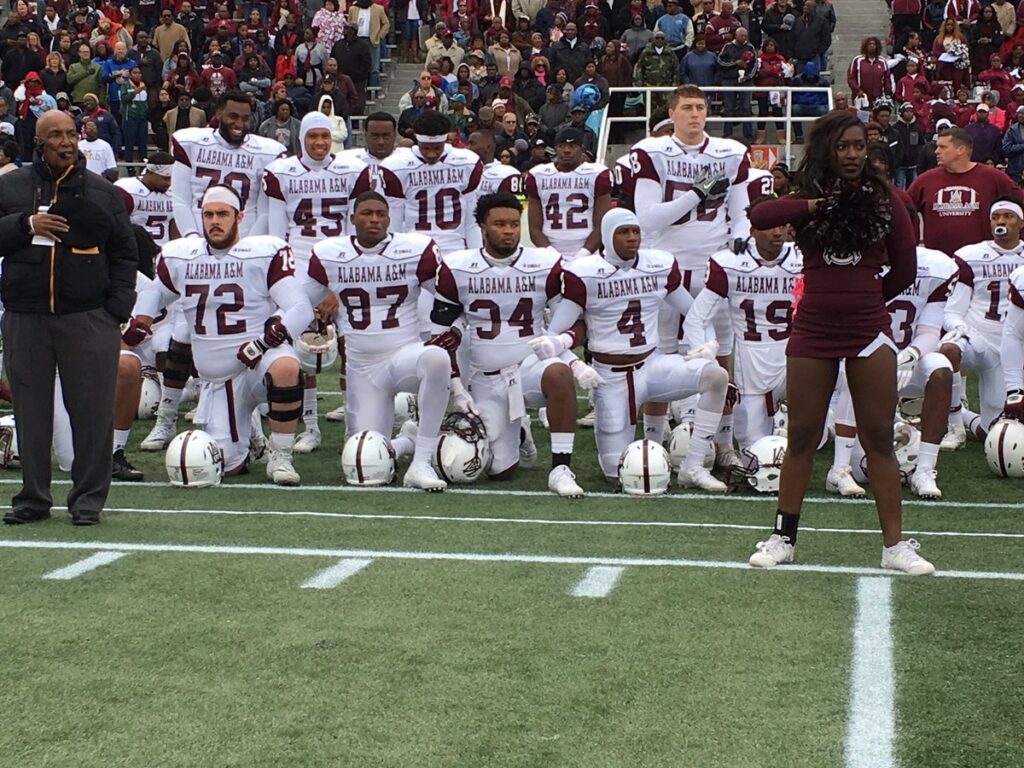Before the biggest game of the 2017 season, the Alabama A&M football team arguably made its most important statement even before the opening kickoff.
It was the Magic City Classic — the annual in-state rivalry matchup between AAMU and Alabama State — that had been played dating back to 1924.
The Bulldogs were 3-1 in SWAC play heading into its October 28, 2017 meeting with the Hornets. The stakes were high, to say the least.
During the national anthem, seven of the 74 AAMU football players unexpectantly took a knee. It was in protest of police brutality and racial discrimination — an act made famous by former NFL quarterback Colin Kaepernick, who first engaged in the demonstration in 2016.

The postmortem of the act was remarkable for two reasons. First, college teams are usually never on the field for the national anthem, so player-led kneeling was something the sport hadn’t dealt with. The Bulldogs had become the first known Division I football team to participate in public dissent.
Additionally, James Spady, the Bulldogs’ head coach at the time, openly supported his players — something that major college football coaches across the country were publicly hesitant to do.
“Here is why it means more,” said Spady at the time. “Because I have an 18-year-old son, and I’m going to get emotional when I talk about this, but I have an 18-year-old son who, if he gets stopped by the police, he has a procedure that we have talked about, I have drilled him on, and I have trained him how to behave when this happens. And I think it’s a shame that I have to do that and someone else doesn’t and from that standpoint, you’re right, there needs to be more awareness about it and that’s how I feel.”
Currently, the country finds itself again grappling with social injustice and race with sports being part of the dialogue after George Floyd was killed by Minnesota police officers.
Spady, now an assistant at Florida A&M, still very much has had a lot to ponder in over the last 13 days.
“I’m a father and I’ve got young black sons,” he said. “When they’re not home, you’re just praying they get home.”
The focus of the growing global human rights demonstrations, Spady said, should not be whether the actions are perceived as disrespectful but to understand that “people are being brutalized.”
“Kaepernick took a knee to bring awareness to an issue that has taken place my entire lifetime,” said Spady who was at Nevada while Kaepernick was the star quarterback was there. “We’ve been the victims of lynching and brutality since the beginning of the United States. Colin just wanted to use his platform to bring attention to that.”
Late last month, North Carolina Central University basketball coach LeVelle Moton admitted during an ESPN Radio interview that he, in the midst of practices, sets up scenarios where players are instructed how to interact with police.
Spady said he’s also conducted similar seminars for his athletes over the years “out of regular need.”
The “Talk” from his perspective has evolved from overture to simply avoid trouble to current conversations that instruct them to just stay alive after confrontations with law enforcement, he said.
“I think it’s always been done,” he said. “But the conversation wasn’t about how to behave to stay alive. “It was how to behave so you don’t get in trouble.”
As it seems, America is at a tipping point. Spady, 54, is optimistic that the energetic actions of young people will spur the substantive changes so many have sought before them.
“I certainly have hope things are going to change, he said. “In every struggle, there has to be some sort of powder keg that pushes change. You have to feel like and expect things are going to go in a different direction,” he said.









Comments 1